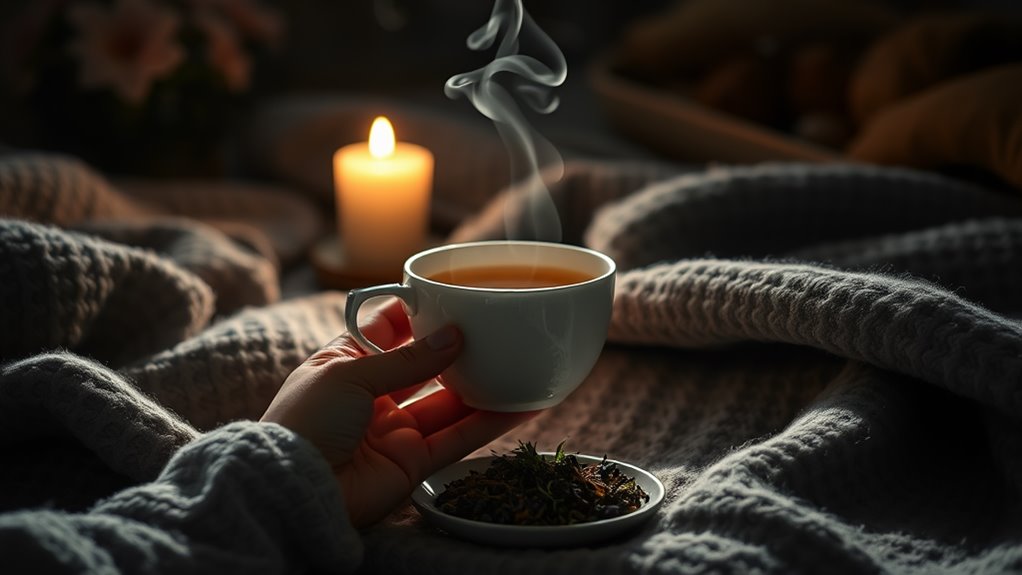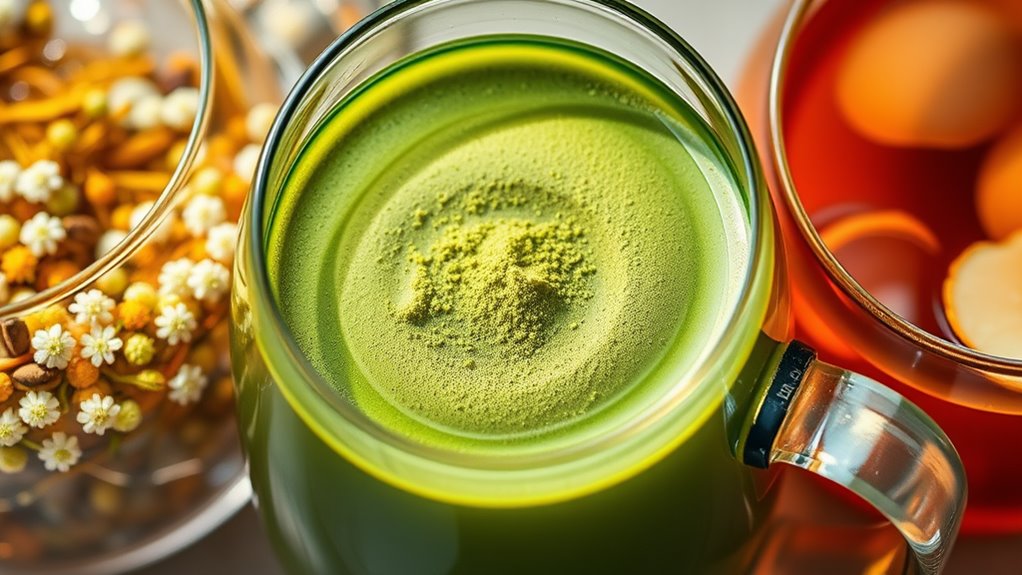This Tea Gave Me the Most Peaceful Sleep Ever
If you’re looking for peaceful sleep, herbal tea might be your solution. Teas with chamomile and valerian root promote relaxation and enhance sleep quality. Their calming properties work with your body to soothe anxiety and prepare you for restful slumber. Preparing a cup as part of your evening routine can transform your nights. Plus, combining tea with mindfulness practices can further improve your sleep experience. Discover how to make this soothing ritual even more effective.
Key Takeaways
- Chamomile tea contains apigenin, which promotes sleepiness and eases the mind for a peaceful night’s rest.
- Valerian root tea reduces anxiety and improves sleep quality, making it ideal for restful sleep.
- Combining lavender with herbal tea enhances its soothing effects, contributing to a more tranquil sleep experience.
- Establishing a calming bedtime routine with herbal tea can signal your body that it’s time to unwind and sleep.
- Drinking herbal tea away from screens and in a cozy atmosphere fosters relaxation, leading to deeper, more restful sleep.
The Science Behind Sleep and Herbal Tea
When you’re winding down after a long day, sipping on a warm cup of herbal tea can do wonders for your sleep. The science behind this lies in the natural compounds found in various herbs.
Ingredients like chamomile and valerian root have been shown to promote relaxation and reduce anxiety, helping your mind unwind. These teas contain antioxidants and flavonoids that positively impact your brain’s neurotransmitters, enhancing the production of sleep-inducing chemicals like serotonin. Additionally, the soothing benefits of bedtime herbal tea are well-documented, making it a popular choice for those seeking better sleep.
Introducing the Sleep-Inducing Tea
As you explore ways to enhance your nighttime routine, introducing a sleep-inducing tea can be a game-changer. This soothing beverage not only warms you up but also helps signal your body that it’s time to unwind.
By sipping on a calming tea before bed, you create a ritual that promotes tranquility and relaxation. It’s a simple yet effective way to transition from the hustle of the day to a peaceful night’s sleep.
Plus, the act of brewing tea itself can be meditative, setting a serene tone for your evening. Consider making it a part of your nightly wind-down, allowing the gentle aroma and warmth to cradle you into a restful state, preparing you for restorative slumber. Research shows that calming properties of tea can significantly improve sleep quality, making it an excellent choice for your bedtime routine.
Key Ingredients and Their Benefits
When it comes to achieving a restful night’s sleep, the key ingredients in your Peaceful Sleep Tea play a vital role.
Chamomile is well-known for its calming properties, helping to ease your mind and promote relaxation.
Meanwhile, valerian root offers additional benefits by reducing anxiety and improving sleep quality, making this tea a perfect bedtime companion. Additionally, incorporating calming ingredients like lavender can further enhance the soothing effects of your tea.
Chamomile’s Calming Properties
Chamomile, often regarded as a gentle remedy, holds remarkable calming properties that can significantly enhance your relaxation routine. When you sip chamomile tea, you’re inviting a wave of tranquility, thanks to its active compound, apigenin. This antioxidant binds to specific receptors in your brain, promoting sleepiness and reducing insomnia.
By incorporating chamomile into your evening rituals, you may find it easier to unwind, easing the day’s stresses. Additionally, chamomile’s anti-inflammatory and antioxidant effects can contribute to overall well-being, supporting your body as you rest.
As you embrace this soothing brew, you’re not just nurturing your sleep; you’re cultivating a more peaceful mind and enhancing your holistic health. So, why not make chamomile your go-to for serene nights?
Valerian Root Benefits
Many people turn to valerian root for its natural sleep-enhancing benefits. This herb has been used for centuries to promote relaxation and improve sleep quality. Valerian root can reduce the time it takes for you to fall asleep and promote deeper, more restorative rest.
Here’s a quick look at its key benefits:
| Benefit | Description | How It Helps |
|---|---|---|
| Sleep Quality | Enhances overall sleep duration and depth. | Helps you wake up refreshed. |
| Anxiety Reduction | Calms nervousness and anxiety levels. | Eases your mind before bedtime. |
| Muscle Relaxation | Relaxes tension in muscles. | Promotes a more comfortable sleep. |
Incorporating valerian root into your nightly routine could lead to a peaceful night’s sleep.
How to Prepare the Perfect Cup
To brew the perfect cup of Peaceful Sleep Tea, it’s essential to pay attention to both the ingredients and the method.
Start with high-quality dried herbs like valerian root, chamomile, and lavender. Measure out one teaspoon of each herb and combine them in a tea infuser.
Boil water, letting it cool for a minute, around 200°F, to avoid scalding the herbs. Pour the hot water over the infuser in your favorite mug and steep for 5 to 7 minutes. This allows the herbs to release their soothing properties, creating a blend that can truly soothe your soul.
Sweeten with honey or a slice of lemon if you like, then sip slowly. Embrace the calming aroma and feel the tranquility wash over you as you prepare for a restful night.
Personal Experience: My Journey to Better Sleep
You might find that sleep struggles can feel overwhelming at times, but you’re not alone in this journey.
Exploring calming solutions, like tea, has made a significant difference for many, helping to ease the mind and body.
Let’s take a closer look at how these soothing brews can transform your nightly routine and promote more restful sleep.
Sleep Struggles and Solutions
Although sleepless nights can feel endless, finding effective solutions has transformed my approach to rest. You might relate to those evenings when you’re tossing and turning, desperate for sleep. Through trial and error, I’ve discovered key strategies that work.
| Struggle | Solution | Tips |
|---|---|---|
| Overthinking | Mindfulness exercises | Try deep breathing before bed |
| Discomfort | Invest in quality bedding | Choose supportive pillows |
| Screen time | Digital curfew | Set a cutoff time for devices |
| Caffeine intake | Limit afternoon coffee | Switch to herbal teas |
Tea’s Calming Effects
After implementing various strategies to tackle my sleep struggles, I found that incorporating tea into my nightly routine made a significant difference.
There’s something soothing about sipping a warm cup before bed. Herbal teas, especially those with chamomile or lavender, promote relaxation and help ease anxiety. You’ll notice how these natural ingredients work together, calming your mind and preparing your body for sleep.
The ritual of brewing tea also adds a moment of mindfulness to your evening. As you take those first few sips, you can feel the tension melting away.
It’s not just about the tea itself; it’s the whole experience that fosters tranquility. Give it a try, and you might discover the peaceful sleep you’ve been longing for.
Incorporating Tea Into Your Evening Routine
As the day winds down, incorporating tea into your evening routine can create a soothing ritual that helps signal to your body it’s time to relax.
Here’s how you can seamlessly integrate tea into your nightly habits:
- Choose caffeine-free herbal teas, like chamomile or valerian root.
- Set a specific time each evening to brew your tea.
- Create a cozy atmosphere with dim lighting and soft music.
- Enjoy your tea away from screens, allowing your mind to unwind.
- Consider journaling while sipping your tea to clear your thoughts.
Additional Tips for a Restful Night
To ensure a truly restful night, it’s essential to establish habits that promote relaxation and tranquility.
Start by creating a calming bedtime routine; consider dimming the lights and engaging in soothing activities like reading or gentle stretching. Limit screen time at least an hour before bed, as blue light can disrupt your natural sleep cycle.
Make your sleep environment comfortable—invest in a supportive mattress and soft bedding, and keep the room cool and dark. Aromatherapy can also work wonders; try essential oils like lavender to enhance relaxation.
Lastly, practice mindfulness or meditation to quiet your mind. These simple adjustments can drastically improve your sleep quality, helping you wake up refreshed and rejuvenated for the day ahead.
Potential Side Effects and Considerations
While creating a peaceful sleep environment is vital, it’s also important to be aware of potential side effects when incorporating sleep aids like herbal teas. Not all herbal blends are created equal, and it’s wise to consider how they might affect you:
-
Allergic Reactions: Some herbs can trigger allergies.
-
Digestive Issues: Certain teas may cause stomach upset or cramps.
-
Drowsiness: While that’s the goal, it can linger into the next day.
-
Interactions with Medications: Always check if the herbal ingredients may interact with any medications you’re taking.
-
Pregnancy or Nursing: Some herbs aren’t safe during pregnancy or lactation.
Being informed ensures you can enjoy your tea while minimizing any unwanted effects, promoting a truly restful night’s sleep.
Final Thoughts on Tea and Sleep Quality
When you consider the connection between tea and sleep quality, it becomes clear that choosing the right blend can significantly impact your rest.
Herbal teas, like chamomile and valerian root, are particularly effective in promoting relaxation and easing you into a peaceful slumber. The warmth of a cup can also create a calming bedtime ritual, signaling to your body that it’s time to wind down.
Remember, it’s not just about the ingredients; the entire experience matters. Take a moment to inhale the soothing aromas, savor each sip, and embrace the tranquility.
By making tea a part of your nightly routine, you’re not just enhancing sleep quality—you’re nurturing your overall well-being.




